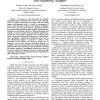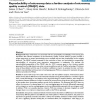730 search results - page 64 / 146 » Learning for control from multiple demonstrations |
107
click to vote
IROS
2006
IEEE
15 years 5 months ago
2006
IEEE
- We propose a novel framework for imitation learning that helps a humanoid robot achieve its goal of learning. There are apparent discrepancies in shapes and sizes among humans an...
JMLR
2008
14 years 11 months ago
2008
This paper presents the dynamics of multiple learning agents from an evolutionary game theoretic perspective. We provide replicator dynamics models for cooperative coevolutionary ...
COLT
2007
Springer
15 years 6 months ago
2007
Springer
Abstract. We establish a generic theoretical tool to construct probabilistic bounds for algorithms where the output is a subset of objects from an initial pool of candidates (or mo...
BMCBI
2007
14 years 12 months ago
2007
Background: Many researchers are concerned with the comparability and reliability of microarray gene expression data. Recent completion of the MicroArray Quality Control (MAQC) pr...
117
click to vote
JMLR
2011
14 years 6 months ago
2011
We propose a framework MIC (Multiple Inclusion Criterion) for learning sparse models based on the information theoretic Minimum Description Length (MDL) principle. MIC provides an...


